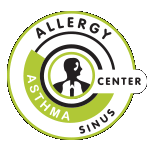WINTER ALLERGIES
Allergy Triggers in the Colder Months
Colder months mean fewer outdoor allergy triggers. Most pollinating plants and trees have died from the first frost of the season, so many of us who suffer from ragweed or tree pollens can breathe a sigh of relief. But there is a flip side. As you spend more time indoors during the winter season, you expose yourself for longer periods of time to indoor allergens, which are referred to as perennial allergens. These allergy triggers are present year-round, like cat or dog dander, mold, and dust mites. You may not be as aware of these indoor allergens during warmer months because you spend more time outdoors (or because the spring and fall allergens demand more immediate attention), but as your time inside increases, you may start to notice symptoms that just don't go away.
What about the holidays?
Some people may think that the live tree or real garland in their homes is causing their noses and eyes to itch. While it's not necessarily pine pollen from your Christmas tree or decorations, your other decorations may be the culprits. Dust can settle and accumulate on the tiniest of surfaces, and it can travel through your home when disturbed. So, those mantle garlands you haven't seen since last December or the ribbons and bows that have been boxed away in the basement might be carrying dust and mold spores into the open air of your home.
Don't forget that the holidays are also a time for exploring new foods and new recipes. If you or your child try something new, stay mindful of symptoms of a food allergy: itchy mouth, trouble breathing, swelling of lips or tongue, or hives. Nuts are a common ingredient in holiday treats, but they're also one of the leading food allergens, and food allergies can happen at any age.
Indoor Allergy Symptoms
You can determine whether you suffer from indoor allergies by taking note of when your symptoms seem worse. If you wake up with a stuffy nose or notice that you breathe a little better after changing the sheets on your bed, dusting your furniture, or giving the rugs and carpet a good vacuuming, then you may have a dust mite allergy. If your eyes start to itch or water and you start sneezing or get a stuffy nose after petting your dog or napping with your cat, you could be allergic to your pet's dander. And if your basement tends to be damp or you have a pesky leak in the bathroom and you notice you're constantly fatigued, congested, or suffering a nagging, dull headache, you could be allergic to mold spores.
How can you know for sure?
A skin test by a board-certified allergist will identify your allergy triggers. Your allergist will get a history of your symptoms and, used with the results of your skin test, will be able to give you a definitive answer about what's causing your reactions. Depending on the severity of your symptoms, you may be advised to start immunotherapy. Immunotherapy turns off your immune system's reaction to your specific allergens, meaning you can find lasting, long-term relief – a cure! Some people find avoidance easy to achieve. Regular cleaning, removal of carpet and rugs, and an improved air filter can create cleaner air; but if those steps are intimidating or you have a pet that's family, avoidance isn't an option. That's when immunotherapy can help.
Be alert for asthma.
The holidays and indoor allergens can be especially intimidating for asthma sufferers. That's why it's important to know what may initiate an asthma attack: scented candles or perfumes, dust mites, even small particles of certain foods in the air. Always have your asthma diagnosed by a board-certified allergist to determine what you should be on the look out for and what actions you should take when an asthma attack starts to occur.
Chronic Sinusitis
If your exposure to indoor allergens continues and you don't find lasting relief, you can develop chronic sinusitis. Sadly, chronic sinusitis doesn't always just go away. It often can worsen and develop into a sinus infection. By working with your allergist, you can know if your sinusitis is caused by allergic triggers or something else, and the more you know, the quicker you can act to feel better all day, every day.

